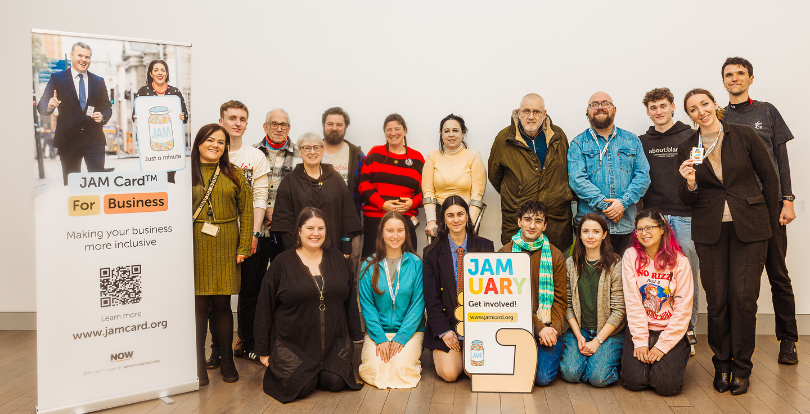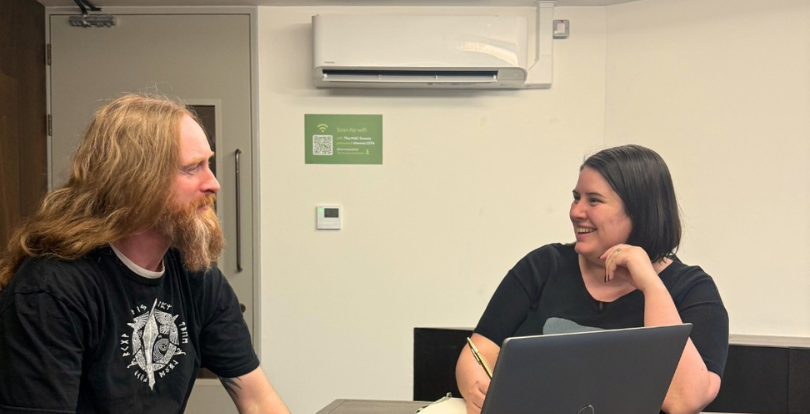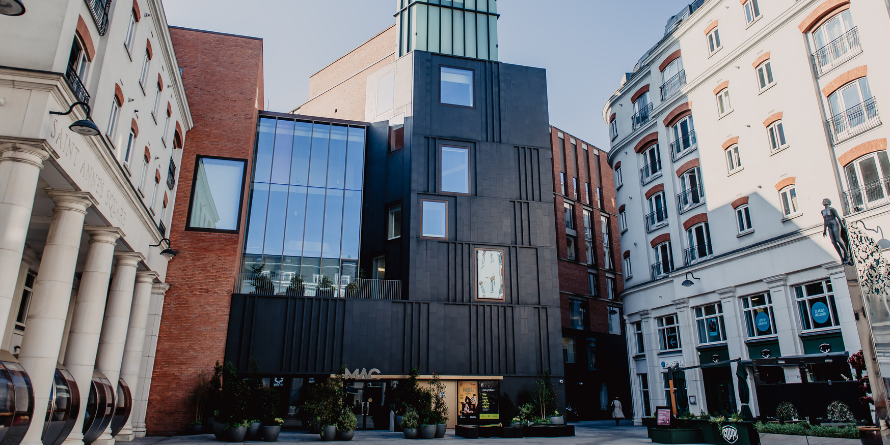New exhibition by former Turner-Prize nominee Phil Collins

Ceremony is centred around the life and work of Friedrich Engels, co-founder of communist theory with his friend Karl Marx. His philosophy was shaped by what he observed in the world’s first industrial city, Manchester, where he lived for 20 years. The film follows Collins’ search for and retrieval of a decommissioned statue of Engels from an Ukrainian village, its journey across Europe, and arrival in Manchester where it was permanently installed last summer in the city centre. In parallel, Ceremony explores Engels’ legacy and the social conditions in Britain today through the stories of people who Collins met during his year-long residency, and his collaboration with local organisations, activists and communities. Featuring Maxine Peake as the voice of Engels, live music recording by Demdike Stare and Mica Levi, and a central performance from Carla Henry, in Belfast the work will be presented as an installation specially designed for our Upper Gallery.
The Tall Gallery will host a large-scale installation Delete Beach from 2016, an anime set in the near future which tells a story of a schoolgirl who joins an anti-capitalist resistance group in a society in which carbon-based energy is outlawed. The film proposes a scenario describing the decline of the oil economy, with the prosperity of the boom years expiring and the necessity of infrastructural changes looming large.
As an art form, anime has repeatedly addressed political themes, often through the lens of complex female characters. In Delete Beach a curious paradox is at work: society has seemingly reached an advanced state of independence from carbon fuels, yet it continues to toil as before under a regime of oppression, inequality and control. Following anime’s recognisable aesthetic and storytelling, Collins’ collaboration with STUDIO4°C, one of Japan’s leading animation studios (Tekkonkinkreet), and pop auteur and film composer Mica Levi (Under the Skin, Jackie) brings to life a world at once familiar and disquietingly corroded.
In the gallery Delete Beach is conjured up as a melancholy shoreline, crashing in from another dimension to play host to an expanded animation environment. The film alternates between Japanese and English language versions, with interludes featuring specially composed music and light sequencing.
Also exhibited in the Tall Gallery is free fotolab from 2009, a slide projection with 80 images from Collins’ ongoing archive of photographs which he collects by putting out a public call for rolls of undeveloped 35mm film, which are processed and returned to participants for free, on the understanding that they relinquish the rights to the artist so he may select and present any of the images. Since 2004 the project has taken place in various locations. Images presented here come from cities as disparate as Milton Keynes, St. Gallen (Switzerland), Belgrade (Serbia), Eindhoven (Netherlands), and Banja Luka (Bosnia and Herzegovina). Bringing together scenes from anonymous, everyday lives, free fotolab is a love letter to 35mm film in the face of its demise in the digital era, and a collective family album of pictures which, despite the differences in their visual style and content, create a rare sense of solidarity.
The final work in the exhibition, the meaning of style from 2011, is presented in the MAC’s Sunken Gallery and explores ways in which subcultures circulate between different historical, ethnic, and social contexts. The film features a group of anti-fascist Malay skinheads who are part of a subculture formed in the 1990s. Filmed in Penang, Malaysia in a series of languorous scenes set in an Indian Tamil cinema, a Chinese Buddhist temple, and a colonial-era mansion, they appear to move between the imaginative and literal spaces of cinema.
The visual cues are all there: shaved heads, polo T-shirts, bomber jackets, braces, jeans, leather boots, tailor-made trousers and sweaters. But the aggression that has come to define skinheads is absent. They reinterpret the style of this typically British subculture and, bridging time and space, restore it to its original, progressive and anti-racist meaning united by community, fashion, and music within their post-colonial South-Asian context. A dreamlike soundtrack by Welsh musician Gruff Rhys and the band Y Niwl moves the film toward something that is neither a pop video nor a visual experiment but more socially and culturally compelling, connected to the universal desire to belong while staking out zones and modes of independence.
The artist Phil Collins said: “When I first arrived to Belfast I was a student on the MA course, and later part of community of artists working at Catalyst Arts. I stayed on the Antrim Road, at College Green, on the Ormeau Road, and up at the Waterworks Park, and the city bled into me. Its lyricism, melancholy and violence served to create a scene which was truly, unmistakably its own. I’m grateful to Belfast for Ski Bunny, Kelly's, Giros, Catalyst, the North Street Arcade, the A1 Bar (the original and the later portacabin), the Hatfield, the Menagerie, Blinkers, for an ongoing political education and a commitment to the public expression of everyday struggle and resistance. I’m honoured to be coming back to a place which was for me a formative crucible, and the works presented at MAC speak to the things I learned and the conversations which started all those unforgettable moons ago.”
Hugh Mulholland Senior Curator said: “It is a great pleasure to be able to host this ambitious exhibition by Phil Collins – This Is The Day at the MAC. Phil Collins is acknowledged as being one of the most important artists of his generation. Throughout his career he has garnered major awards including Paul Hamlyn Award for Visual Arts in 2001, and was nominated for Artes Mundi Prize in 2012 and Turner Prize in 2006. His works are represented in the collections of Museum of Modern Art, Guggenheim Museum and Metropolitan Museum of Art in New York; Tate Gallery in London; Museum of Fine Arts in Boston; Irish Museum of Modern Art in Dublin; and National Gallery of Canada in Ottawa, among others. It is with some pride that we can say that his career began in Belfast where he studied at the Art College and where he had his first significant solo exhibition at Ormeau Baths Gallery, in 2003.”
Ceremony was co-commissioned by 14-18 NOW, HOME, Manchester and Manchester International Festival.
Jenny Waldman, Director from 14-18 NOW said: “At 14-18 NOW we commission artists to create new work in response to the First World War and the events of 1914-18. It is now 100 years since the ideas from The Communist Manifesto, written by Engels and Karl Marx, changed the course of history by inspiring the Russian Revolution during the final phase of the First World War. We would like to thank Phil Collins for this powerful work that explores the impact of Engels today.”
This exhibition is supported by National Lottery funding through the Arts Council of Northern Ireland.





